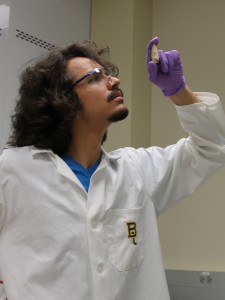This is the second in a series of Scholars Week preview articles by Caleb Barfield, a student worker in the Office of the Vice Provost for Research. Caleb is a freshman from Denton majoring in journalism, new media and public relations.
Click here to check out more previews of the great research Baylor students will present at URSA Scholars Week 2014, March 31-April 4.
In recent years, scientists and law enforcement officials have documented increases in illegal dumping and hazardous waste pollution in Central America. This has led environmental scientists to question if an increase in exposure to these toxicants may be threatening Belizean and Costa Rican crocodile populations.

Derek Newberger examines crocodile scutes, the spiny scales found on the crocodile’s tail. Photos by Caleb Barfield.
Senior biology major Derek Newberger and the chair of the Environmental Science department, Dr. George Cobb, are studying crocodile scutes (external scales on the crocodile’s tail) to determine if there has been a measurable increase in exposure to toxicants.
“Currently, I’m searching for the bioaccumulation of mercury and transition metals in American crocodile scutes from Belize and Costa Rica,” Newberger said.
Newberger has teamed up with an environmental protection organization in Central America to attain samples of crocodile scutes that can be transported to his lab for testing.
“This all started with a non-profit organization called the ACES (American Crocodile Education Sanctuary) permitted by the Belize forest department to transport crocodiles to a safe, natural and habitable ecosystem,” Newberger said. “The organization started in order to promote the conservation of wetland habitats and species.”
Cobb oversees the relations between Baylor’s Science Department and the ACES. He also collaborates with colleagues, Dr. Thomas Rainwater (Medical Univ. of South Carolina) and Dr. Frank Mazzotti (Univ. of Florida), to help further the research they are doing in Central America.

Crocodile scutes can contain accumulation of toxicants to which crocodiles are exposed over their lifetime.
“The ACES is working to document the illegal dumping of waste and contaminants into aquatic habitats on the island and to determine if crocodiles living in and near these areas are in fact accumulating elevated and potentially unsafe contaminant concentrations,” Cobb said.
Although there is no clear answer as to whether or not increased exposure to mercury and other metals has caused adverse health effects, if the crocodile populations of Central America suffer heavy losses, then there could be grave consequences.
Newberger explained, “The crocodiles are apex predators and a keystone species, so if this leads to a decrease in population the whole ecosystem could suffer dramatic effects.”
According to Cobb, “Loss or reductions of keystone species such as crocodiles would alter the food web by removing a significant predator for many other organisms in the aquatic areas they inhabit.”

Studying toxicants found in crocodile scutes can help scientists asses the health risks of pollution in aquatic environments.
Newberger and Cobb’s research will aid the scientific community in assessing the potential problem in Belize and will help provide solid evidence that will either confirm or negate the un-natural increase in mercury and other metallic toxicants, so that the local government can act on it either way.
Newberger and Cobb’s research will aid the scientific community in assessing the potential problem in Belize and will help provide solid evidence that will either confirm or negate the unnatural increase in mercury and other metallic toxicants, so that the local government can respond appropriately.
“As scientists, we serve as an objective party with the goal of testing hypotheses and obtaining data,” Cobb said.” “Our work in Belize will help document the concentrations of contaminants in crocodiles living in aquatic areas. This data will help us and other scientists assess potential health risks to crocodiles and can serve as a baseline for comparison in future assessments. Lastly, elevated concentrations of certain metals in crocodiles might alert citizens and government officials to potential human health risks associated with consuming fish and other wildlife in the lagoons and other areas sampled.”
No matter what the research concludes, Newberger will be forever grateful for the opportunity to be involved in such important research.
“As a student at Baylor I am very thankful to be able to work alongside students and professors who aren’t even involved in my major and collaborate with them in my research,” Newberger said. “I’ve been impressed by the accessibility and approachability of Dr. Cobb. He has made himself more than available to me and my research and I believe those traits are something unique to Baylor.”
